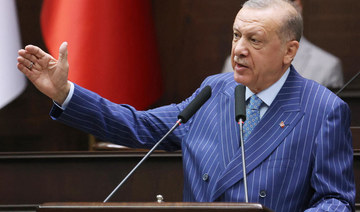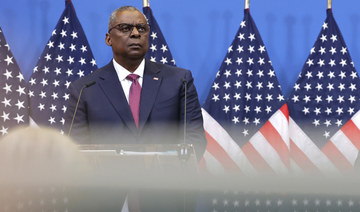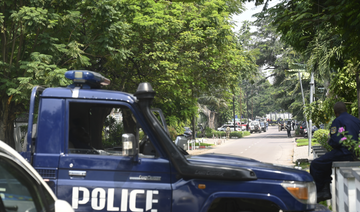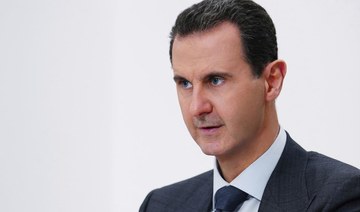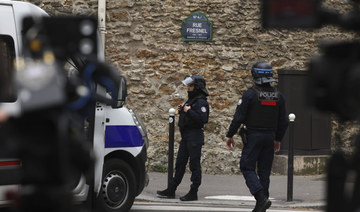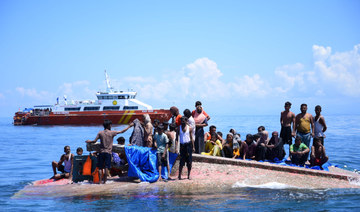MADRID: Spain is lobbying for NATO to pay more attention to security threats on its southern flank when the military alliance gathers for a summit in Madrid later this week.
But with the war in Ukraine entering its fifth month, the priority for Spain’s NATO partners remains firmly on deterring Russian in the east.
When NATO leaders convene in Madrid on June 28-30 they are due to revamp the alliance’s strategic concept, which outlines its main security tasks and challenges but has not been revised since 2010.
Spanish Foreign Minister Jose Manuel Albares has been pushing for NATO to broaden its scope to help deal with non-military threats such as “the political use of energy resources and illegal immigration” in Africa.
“The threats are as much from the southern flank as from the eastern flank,” he told a Madrid news conference on Wednesday.
Madrid is also concerned about lawlessness and violent Islamist movements in the Sahel region, a vast territory stretching across the south of the Sahara Desert.
“We have this war in Europe, but the situation in Africa is really worrying,” said Spanish Defense Minister Margarita Robles.
The issue is particularly acute for Spain, a main gateway into Europe for irregular migration from Africa and a country which relies on Algeria for gas supplies.
Last year Morocco allowed thousands of migrants to enter Spain’s North African enclave of Ceuta during a diplomatic crisis over the disputed Western Sahara, prompting Madrid to accuse Rabat of “blackmail.”
Although the two countries recently normalized their relations after Spain ended its decades-long position of neutrality over Western Sahara to publicly support Morocco’s stance, the migration crisis hasn’t come to an end.
On Friday at dawn, around 2,000 African migrants tried to storm the border with Melilla, the other Spanish enclave on Morocco’s northern coast. At least 23 died in the incursion, making it the deadliest incident to occur at the borders of the two Spanish enclaves — the only borders between the EU and Africa.
And earlier this month Morocco’s arch-rival Algeria suspended a co-operation treaty with Spain in response to Madrid’s U-turn over Western Sahara.
But with an active conflict on NATO’s eastern flank, it is going to be “an uphill struggle” to convince member states to make a commitment to the southern flank, said Sinan Ulgen, a NATO expert at the Carnegie Europe think-tank in Brussels.
“The war in Ukraine has changed the equation. The threat from Russia has become the main preoccupation for almost all the countries,” the former Turkish diplomat said.
In Washington, US national security spokesman John Kirby said “the focus right now is on the eastern flank.”
“But there remains a continued effort to make sure we are also paying attention to the southern flank,” he added.
In an interview published Saturday by Spanish daily El Pais, NATO secretary-general Jens Stoltenberg said the Alliance would “strengthen (its) cooperation with southern countries,” mentioning Mauritania in particular.
Aside from Russia, Washington’s other major concern is China, which is expected to be mentioned in NATO’s strategic concept for the first time.
To try to convince its NATO allies, Spain has sounded the alarm over the growing presence of Russian mercenaries in African nations like Mali and the Central African Republic, arguing instability could increase African migration to Europe.
Madrid has also suggested that Russia was behind Spain’s recent diplomatic spat with Algeria.
“Unfortunately the threats from the south are increasingly Russian threats from the south,” Albares said.
Ulgen said that another difficulty is that while other southern European nations want a greater NATO engagement in Africa, they have different priorities, making it hard to set a common alliance-led strategy.
“Rome, Paris, Madrid, Ankara still assess the political and security challenges differently. That is the fundamental reason why there is not a stronger push for NATO to have a bigger role” in the southern flank, said Ulgen.
In addition, many top US policymakers believe NATO should focus on territorial defense, not non-conventional threats, said Angel Saz, the director of the Center for Global Economy and Geopolitics at Spain’s Esade business school.
“And the only threat to territorial defense is Russia. The Sahel can destabilize Europe, but it will not conquer Spain or Italy,” he said.
Spain has “perhaps put too much emphasis” on the call for a greater NATO role in the southern flank and “it runs the risk of under accomplishing,” he added.
NATO summit host Spain seeks focus on southern security
https://arab.news/yxejx
NATO summit host Spain seeks focus on southern security
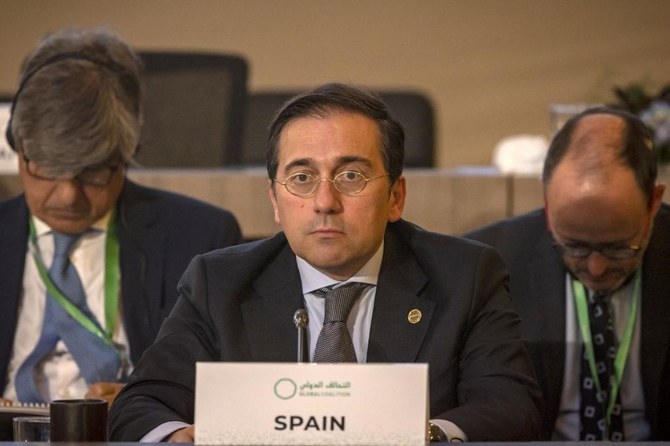
- When NATO leaders convene in Madrid on June 28-30 they are due to revamp the alliance’s strategic concept
Utah man declined $100K offer to travel to Congo on ‘security job’ that was covert coup attempt
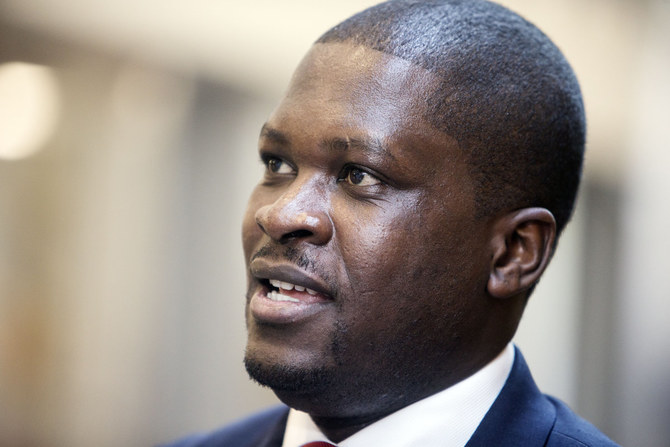
- American Daniel Gonzalez said one of his friends from West Jordan, Utah, was among the 6 killed last week during a foiled coup attempt in DR Congo
- He said the offer was made by the son of coup leader Christian Malanga, who was killed by Congo security forces while resisting arrest
SALT LAKE CITY: The friend of a prominent Congolese opposition leader’s son said he turned down a six-figure offer to travel there from the US as part of the family’s security detail in what turned out to be a failed coup attempt.
Marcel Malanga, the 21-year-old son of eccentric coup leader Christian Malanga, was detained by Congolese forces Sunday morning, along with a former classmate from their hometown of West Jordan, Utah, after his father was killed in a shootout while resisting arrest. His high school football teammate, Tyler Thompson, 21, was one of two other Americans arrested after an ill-fated attack on the presidential palace in Kinshasa.
Six people were dead and dozens arrested, including the three Americans, following that attack and another on the residence of a close ally of President Felix Tshisekedi, the Congolese army spokesperson, Brig. Gen. Sylvain Ekenge, said.
Daniel Gonzalez, a former teammate of the two Utah residents caught up in the foiled coup, told The Associated Press that Marcel had offered him $50,000 to $100,000 to spend four months in Congo as a security guard for his politician father. The 22-year-old FedEx worker strongly considered it, but said it lacked concrete details. He ultimately declined so he could spend the summer with his girlfriend.
“I feel really sad for Tyler and Marcel but, at the end of the day, I can just be grateful that I didn’t go because I would be stuck in the same scary situation,” Gonzalez said.
Marcel’s lucrative offer to Gonzalez sheds light on how he might have enticed Thompson to come along on what his stepmother, Miranda, said was supposed to be a vacation.
It was one of many propositions the coup leader’s American son made to former football teammates in what many described as a desperate effort to bring someone with him to Congo. He pitched the trip to some as a family vacation and still to others as a service trip to build wells in drought-stricken communities.
Although it’s unclear whether Thompson was offered money, multiple teammates told the AP that he had alluded to such incentives, telling one friend that the trip could be a “big financial opportunity.”
Thompson’s family insists he’s a political pawn who was dragged into an international conflict under false pretenses. They’ve had no direct communication with their son since the coup and are worried for his safety, his stepmother said.
Marcel’s mother, Brittney Sawyer, said her son is innocent and had followed his father.
Christian Malanga, the slain leader of the Congolese opposition political party, considered himself president of a shadow government in exile, which he called the “New Zaire.” He described himself on his website as a refugee who settled in Salt Lake City with his family in the 1990s, pursuing business opportunities in gold mining and used car sales before eventually moving back to Congo to fight for political reforms.
While campaigning for the Congolese Parliament, he claimed he was jailed and endured torturous beatings. He later published a manifesto detailing plans to reform Congo’s security services and described his movement as an effort to organize fellow emigres against the “current Congolese dictatorship government regime.”
“Marcel was pretty secretive about his dad. He didn’t even know him well until he spent last summer in Africa,” Gonzalez said. “There’s no way Marcel had any idea what he’d be getting us into or he never would’ve offered. He’s one of the best friends a person could have.”
In the early hours Sunday, Christian Malanga began livestreaming video on social media from inside the palace. He is seen with his armed son, who hastily pulls a neck gaiter over his face, looking around wide-eyed. Congo officials have not commented on how the attackers were able to get inside.
Gonzalez, of Herriman, Utah, said he had communicated with Marcel about the financial offer over Snapchat, in messages that have since disappeared, in the months leading up to the coup attempt. He was shocked to learn how the trip played out.
Marcel had told Gonzalez that his father was letting him hire a friend so he would have company during his summer abroad. He seemed excited to be able to offer such a substantial amount of money to a close friend who needed it, Gonzalez explained.
The Malangas had promised on-the-job training, full coverage of travel expenses and the chance to explore a new part of the world while making an income, he said. Marcel insisted repeatedly that it was safe, but didn’t share details about his father’s background.
Neither Gonzalez nor his mother thought the trip would be unsafe, he said, despite the US State Department strongly discouraging travel to Congo — but he turned it down when his girlfriend asked him not to leave for four months.
He later saw private Snapchat videos filmed by Marcel that showed Thompson looking frightened as armed Congolese soldiers surrounded their vehicle. In Gonzalez’s final Snapchat exchange with his friend before their capture, he asked whether Thompson was OK and urged them to stay safe.
Marcel assured him that they were.
Other former football teammates, including Luke Barbee and Jaden Lalor, had heard different pitches about the trip and wondered why Marcel seemed so desperate to bring someone along. Neither could fathom their friends’ possible involvement in a violent attack.
“I consider Marcel a brother to me and Tyler a friend, and I truly believe Marcel’s father must have pressured them for his own wants,” Lalor said. “I just want them back safely.”
Defense Secretary Lloyd Austin resumes duty after undergoing procedure at Walter Reed
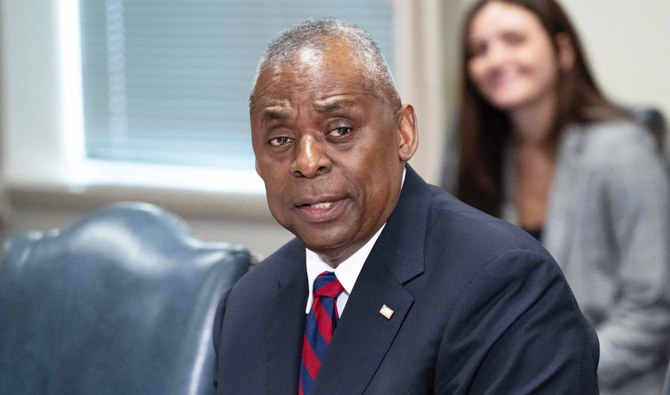
WASHINGTON: Defense Secretary Lloyd Austin underwent a medical procedure at Walter Reed National Military Medical Center Friday evening and has resumed duty after temporarily transferring power to his deputy, Pentagon press secretary Maj. Gen. Pat Ryder said in a statement.
Austin is continuing to deal with bladder issues that arose in December following his treatment for prostate cancer, Ryder said.
The procedure was successful, elective and minimally invasive, “is not related to his cancer diagnosis and has had no effect on his excellent cancer prognosis,” the press secretary said.
Austin transferred authority to Deputy Secretary of Defense Kathleen Hicks for about two-and-a-half hours while he was indisposed, the Pentagon said.
The Pentagon chief returned home after the procedure. “No changes in his official schedule are anticipated at this time, to include his participation in scheduled Memorial Day events,” Ryder said.
Austin, 70, has had ongoing health issues since undergoing surgery to address a prostate cancer diagnosis. He spent two weeks in the hospital following complications from a prostatectomy. Austin faced criticism at the time for not immediately informing the president or Congress of either his diagnosis or hospitalization.
Austin was taken back to Walter Reed in February for a bladder issue, admitted to intensive care for a second time and underwent a non-surgical procedure under general anesthesia at the time.
The Pentagon has notified the White House and Congress, Ryder said.
More than 300 buried in Papua New Guinea landslide, local media says
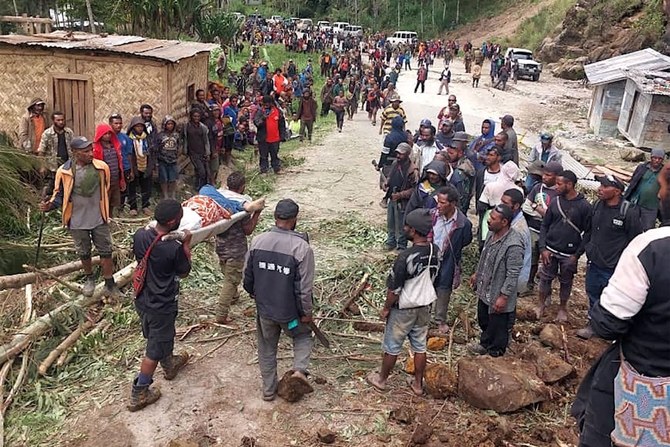
- Hundreds are feared dead in the landslide that hit Kaokalam village
SYDNEY: More than 300 people and over 1,100 houses were buried by a massive landslide that levelled a remote village in northern Papua New Guinea, local media reported on Saturday.
Hundreds are feared dead in the landslide that hit Kaokalam village in Enga Province, about 600 km (370 miles) northwest of capital Port Moresby, around 3 a.m. on Friday (1900 GMT on Thursday).
The landslide in the Pacific nation north of Australia buried more than 300 people and 1,182 houses, the Papua New Guinea Post Courier said, citing comments from a member of the country’s parliament, Aimos Akem. Akem did not immediately respond to Reuters request for comment via social media.
More than six villages had been impacted by the landslide in the province’s Mulitaka region, Australia’s Department of Foreign Affairs and Trade (DFAT) said on Saturday.
“Australia’s High Commission in Port Moresby is in close contact with PNG authorities for further assessments on the extent of the damage and casualties,” a DFAT spokesperson said in a statement.
The Australian Broadcasting Corp. reported on Saturday that four bodies had been retrieved from the area after emergency teams reached the sparsely populated area, where the death toll is expected to rise.
The landslide has blocked highway access, making helicopters the only way to reach the area, the broadcaster reported.
Social media footage posted by villager Ninga Role showed people clambering over rocks, uprooted trees and mounds of dirt searching for survivors. Women could be heard weeping in the background.
Prime Minister James Marape has said disaster officials, the Defense Force and the Department of Works and Highways were assisting with relief and recovery efforts.
French court sentences 3 Syrian officials to life in prison in absentia for war crimes
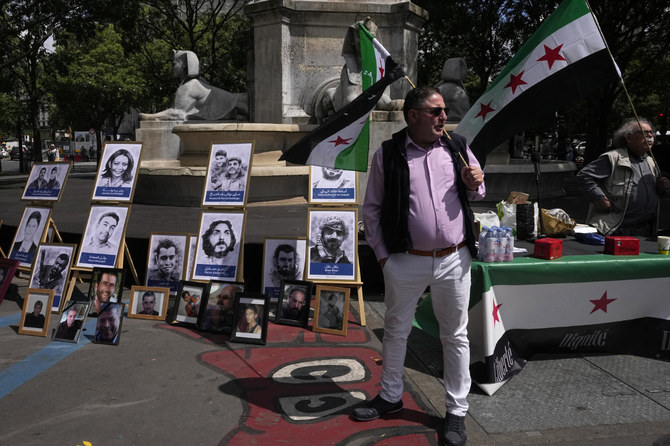
- The trial focused on the officials’ role in the alleged 2013 arrest in Damascus of Mazen Dabbagh, a Franco-Syrian father, and his son Patrick, and their subsequent torture and killing
- Former intelligence officials Ali Mamlouk, Jamil Hassan, and Abdel Salam Mahmoud are the most senior Syrian officials to go on trial in a European court over crimes allegedly committed during the country’s civil war
PARIS: A Paris court sentenced three high-ranking Syrian officials in absentia to life in prison Friday for complicity in war crimes in a landmark case against the regime of Syrian President Bashar Assad and the first such case in Europe.
The trial focused on the officials’ role in the alleged 2013 arrest in Damascus of Mazen Dabbagh, a Franco-Syrian father, and his son Patrick, and their subsequent torture and killing. The four-day trial featured harrowing testimonies from survivors and searing accounts from Mazen’s brother.
Though the verdict was cathartic for plaintiffs, France and Syria do not have an extradition treaty, making the outcome largely symbolic. International arrest warrants for the three former Syrian intelligence officials — Ali Mamlouk, Jamil Hassan, and Abdel Salam Mahmoud — have been issued since 2018 to no avail.
They are the most senior Syrian officials to go on trial in a European court over crimes allegedly committed during the country’s civil war.
The court proceedings came as Assad has started to shed his longtime status as a pariah that stemmed from the violence unleashed on his opponents. Human rights groups involved in the case hoped it would refocus attention on alleged atrocities.
Clémence Bectarte, the Dabbagh family lawyer from the International Federation for Human Rights, said the verdict was the “first recognition in France of the crimes against humanity of the Syrian regime.”
“It is a message of hope for all Syrian victims who are waiting for justice. It is a message that must be addressed to states so that they do not normalize their relations with the regime of Bashar Assad,” she said.
The trial began Tuesday over the alleged torture and killing of the French-Syrian father and son who were arrested at the height of Arab Spring-inspired anti-government protests. The two were arrested in Damascus following a crackdown on demonstrations that later turned into a brutal civil war, now in its 14th year.
The probe into their disappearance started in 2015 when Obeida Dabbagh, Mazen’s brother, testified to investigators already examining war crimes in Syria.
Obeida Dabbagh and his wife, Hanane, are parties to the trial along with non-governmental organizations. They testified in court on Thursday, the third day of the trial.
Obeida Dabbagh said he hoped the trial would set a precedent for holding Assad accountable. “Hundreds of thousands of Syrians have died. Even today, some live in fear and terror,” he said.
Despite the defendants’ absence, the trial’s significance was underscored by Brigitte Herremans, a senior researcher at the Human Rights Center of Ghent University. “It’s very important that perpetrators from the regime side are held accountable, even if it’s mainly symbolic. It means a lot for the fight against impunity,” she said.
Some 45,000 Rohingya have fled fighting in Myanmar: UN
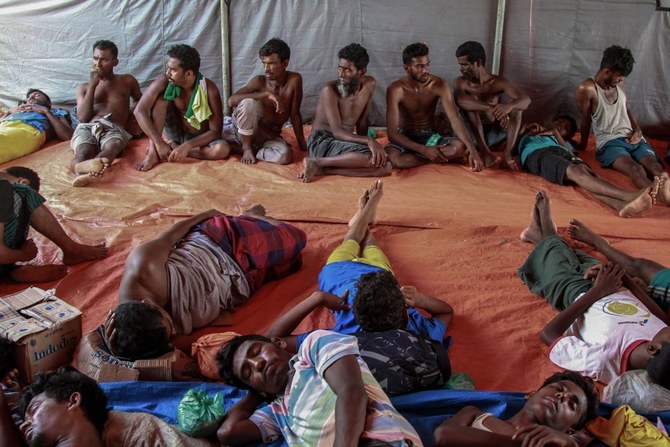
GENEVA: The United Nations warned on Friday that escalating fighting in conflict-torn Myanmar’s Rakhine State had forced around 45,000 minority Rohingya to flee, amid allegations of killings and burnings of property.
“Tens of thousands of civilians have been displaced in recent days by the fighting in Buthidaung and Maungdaw townships,” UN rights office spokeswoman Elizabeth Throssell told reporters in Geneva.
“An estimated 45,000 Rohingya have reportedly fled to an area on the Naf River near the border with Bangladesh, seeking protection,” she said.
Clashes have rocked Rakhine since the Arakan Army (AA) attacked forces of the ruling junta in November, ending a ceasefire that had largely held since a military coup in 2021.
The AA says it is fighting for more autonomy for the ethnic Rakhine population in the state, which is also home to around 600,000 members of the persecuted Rohingya Muslim minority.
Hundreds of thousands of Rohingya fled Rakhine in 2017 during a crackdown by the military that is now the subject of a United Nations genocide court case.
“Over a million Rohingya are already in Bangladesh, having fled past purges,” Throssell pointed out.
UN rights chief Volker Turk was urging Bangladesh and other countries “to provide effective protection to those seeking it, in line with international law, and to ensure international solidarity with Bangladesh in hosting Rohingya refugees in Myanmar,” she said.
James Rodehaver, head of the rights office’s Myanmar team, described the horrifying situation many were fleeing from.
He said his team had received testimonies and seen satellite images, online videos and pictures indicating that Buthidaung town had been “largely burned.”
“We have received information indicating that the burning did start on May 17... two days after the military had retreated from the town... and the Arakan Army claimed to have taken full control of the village.”
He stressed that the UN rights office was still working to corroborate that information, to clearly establish “who were the perpetrators.”
One survivor had described seeing dozens of dead bodies as he fled Buthidaung, while another had said he was among tens of thousands who fled the town only to find themselves blocked by the AA on the road west toward Maungdaw town.
Other survivors also said AA members had abused them and extorted money from them as they tried to make their way to Rohingya villages south of the town.
In the weeks leading up to the burning of Buthidaung, Rodehaver said the rights office had documented renewed attacks on Rohingya civilians by both AA and the military in northern Rakhine, including through air strikes.
The team had documented “at least four cases of beheadings,” he said, adding that they had determined with a high level of confidence that those were carried out by the AA.
Beyond Buthidaung, Throssell warned of “clear and present risks of a serious expansion of violence.”
She pointed to the beginning of a battle for Maungdaw town, where the military has outposts and where a large Rohingya community lives.
“In this appalling situation, civilians are once more victimized, killed, their properties destroyed and looted, their demands for safety and security ignored,” she said.
“They are again forced to flee their homes in a recurring nightmare of suffering.”



